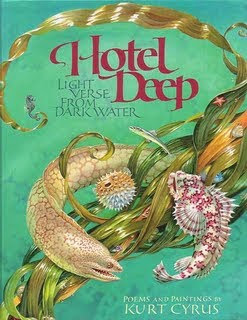Hotel Deep: Light Verse from Dark Waters by Kurt Cyrus

Bibliography:
Summary:
Through the eyes of a lost sardine, somehow separated from his school, Kurt Cyrus takes readers on a mysterious adventure through the dark, deep waters of the ocean. Creative verse and beautiful paintings illustrate the lives of various sea creatures, from the bottom-dwelling flounder to the darting and dangerous marlin. Poems physically take shapes that illustrate the movement of each creature, curling up and around the page or striking hard and angular lines that resemble the appendages of crayfish as they scuttle across the ocean floor. The personalities of ocean creatures are revealed page by page, until the sardine finally finds his way back to the safety of his school. Cyrus makes poetry fun and interesting in this intriguing look at the mysteries of the deep.
Thoughts:
This book of verse is a fun and whimsical introduction to poetry for elementary students. Almost poetry-in-disguise, the reader is immediately intrigued by the physical layout of poems, as well as the mysterious introduction that invites readers to plunge into the unknown territory of the deep ocean. The subject matter is engaging for students, and the variety of creatures holds their interest. Hotel Deep is a fun example of poems embodying their subject matters. Exclamation points, italics, and short, choppy sentences illustrate the dashing movements of the dangerous marlin. Crayfish march one by one, step by step with precision to an unknown location, illustrated by lines and declaratives. The winding pattern of the sea snake flows through two pages, words swirling with the snake as he stalks his prey. Hotel Deep is a good book for reluctant readers of poetry, as its creatively assembled poems and beautiful illustrations almost make the reader forget that they are reading poetry at all. Some of the language and tone may be difficult for younger readers, but all will find the whimsy of these poems enjoyable and interesting.
Reviews:
"Untitled verses describe a colorful array of ocean creatures, both benign and dangerous, observed by a lone sardine searching for the swirling band of companions that he lost when the school spun out of the range of an invading marlin. "Where did everyone go?/One sardine. Apart. Alone./Welcome to the Mystery Zone." The handsome, busy views convey mystery with clever placement of creatures–some unnamed, some partially hidden, some more realistic than others. Though the sardine is mostly a passing observer, his continuing presence lends a bit of story line to the energetic scenes of underwater life. Moments of fear and danger thread throughout. "Life in the sea offers little that's free;/There's always a devil to pay." There's plenty to see and ponder though some oblique references and the sometimes mocking tone will elude many children. A thumbnail picture-glossary names some 28 species of marine life but provides no explanations or added information. Overall, this is a cheerful tour for browsers that also offers possibilities for shared reading." - School Library Journal
"Deep in the ocean a tiny sardine is lost in a great coral reef. Cyrus' lavishly colored, detailed paintings show the creatures that lurk in the gorgeous underworld, and in some of his accompanying poems, the language flows like the action it describes. It darts, swerves, and swivels on the page like the sardine; swoops, then loops like a calico scallop; swells into a prickly sack like a porcupine fish; and swirls like a crayfish through a seaweed curtain. The vibrant visuals grab all the attention; there's no space to imagine other images to match Cyrus' words. But the sounds of the poetry are as much fun as the exciting action in the wild setting, making this a great read-aloud for sharing--even with younger grade-schoolers." - Booklist
Ideas for Use:
Hotel Deep would be a great resource to use in the classroom outside of a poetry unit. By using a book of verse such as this in studying something like the ocean, students are immersed in poetry in its true form without their being intimidated by the concept. A teacher can use this book as a springboard for a unit on the ocean, combining science with poetry. Students can research an ocean creature of his or her choice, then write a poem about the creature using what they have learned. Teachers may also wish to use this book as an example and lead-in to a unit on a different habitat, such as the rainforest or desert. Students can use the same ideas found in Hotel Deep and write poems creatures found in those various habitats and their behaviors. Poems can be illustrated and displayed together in a replication of the habitat that is represented.
No comments:
Post a Comment